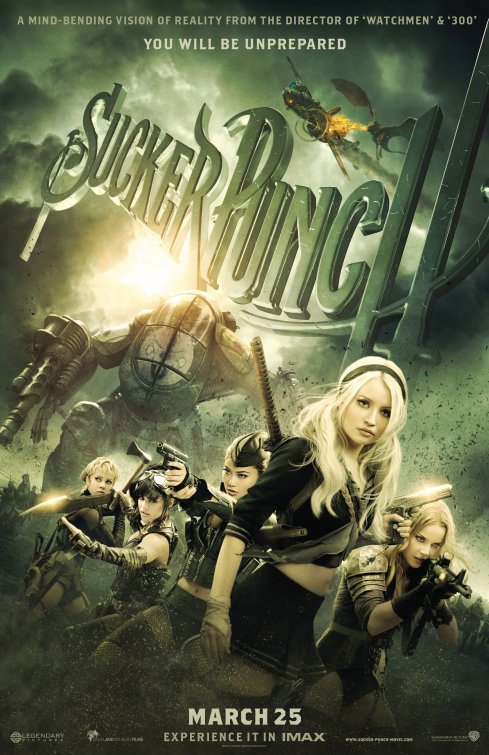You Will Be Unprepared
Director
Zack Snyder
Starring
Emily Browning
Abbie Cornish
Vanessa Hudgens
Jena Malone
Jamie Chung
Carla Gugino
Oscar Isaac
Jon Hamm
Scott Glenn
I went into this movie with absolutely no expectations. Apart from the theatrical trailer I intended to approach this film with as little insight as possible. I have no idea if that helped or if watching it on an IMAX screen contributed but God help me, I almost enjoyed Sucker Punch. I think, ultimately, it’s because I get what Zack Snyder was trying to do – or at least, I think I do.
During an intense, dialogue free opening sequence, we are introduced to Babdydoll [Browning] – whose real name is never mentioned – and the circumstances that led to her incarceration at the Lennox House institution for the criminally insane. Following the death of her mother, Babydoll did her best to protect her sister from their abusive, alcoholic step-father but after an armed confrontation, Babydoll accidentally kills her sister. Overcome with guilt, she refuses to testify and her step-father has seen to it that a swift lobotomy will be performed, to ensure nobody ever discovers the truth. Once in the asylum, Babydoll discovers she has five days until a specialist will arrive to perform the surgery and begins to form an escape plan. All straight forward so far, no problems there. Everything becomes a little disjointed when Babydoll is taken to the operating chair, only to cut to Sweet Pea [Cornish] on-stage arguing with the director, Vera Gorski [Gugino], about the nature of what we’ve just seen. Subsequently, the narrative world has shifted, the characters are the same but the asylum surroundings are now that of a criminally-run brothel. It’s at this point that the corrupt orderly Blue (now a violent mobster running the club, played by Oscar Isaac), introduces Babydoll to the other girls, explaining she is being saved for the High-Roller [Hamm], who will be arriving in five days. Obviously this is both a narrative device and a representation of Babydoll’s fantasy regression to cope with her predicament. To add to the story-within-a-story, Babydoll is expected to dance for clients; as entrancing and degrading as the dance may be the audience never sees it – instead we witness the fantastical worlds that Babydoll envisions, in which she’s banding together with her fellow captives to overcome ridiculous obstacles; ranging from giant samurai warriors, to dragons and orcs, to steam-punk trench warfare.
On the positive side, Zack Snyder has created a very beautifully crafted world, littered with glorious art design, evocative costumes, detailed sets and action sequences with phenomenal visual execution. In an interesting move, he’s also favoured female vocalist covers of poignant songs by The Pixies, Bjork, Jefferson Airplane and The Beatles – often performed by Emily Browning – in addition to Tyler Bates’ heavy riffing and orchestral pounding to the harmonic tunes of said tracks. The whole thing resonates with a combination of haunting rock musical and full-on epic theatrical score that feels wholly fitting for the on-screen exploits. In addition to the stunning visuals and excellent audio work, Snyder’s multi-layering is hard at work with self referential, almost fourth wall breaking moments that speak to the audience about what they claim they want. Using over the top sexual metaphors and fetishist driven scenarios to detail and represent the true nature of using sex to get what you want/need. Furthermore, a lot of this film feels like an open statement to producers and audiences almost taunting them by saying ‘this is what you asked for, you want guns and girls and over-the-top action, I did what you asked, are you happy now!?’ Cemented by the final narration: “Who teaches us what’s real and how to laugh at lies? Who decides how we live and what we’ll die to defend? Who claims us and who holds the key that can set us free? It’s you”
Despite any enjoyment I felt, there are some glaring flaws that really pissed me off. First things first, we need to address the whole second layer: the brothel/club. There appears to be almost no real link between the asylum and club other than the aforementioned sexual metaphors, so when certain cast members die, you can’t help but wonder how that translated in the real world. I understand that ambiguity and subsequent debate-driven conversation might be intentional but it almost felt as if Snyder wanted to write a story in a brothel environment but felt Babydoll’s visions wouldn’t be explainable without severe mental trauma. Then, of course, there’s the supporting cast and the sheer lack of reasonable backstory. You see, of the five lead girls (Babydoll, Sweet Pea, Rocket [Malone], Amber [Chung] and Blondie [Hudgens]) we only witness Babydoll’s history and briefly glean allusions to the sibling struggle between Sweet Pea and Rocket. On top of that, these backstories are only explored in the brothel layer, so a great deal of doubt and confusion is cast over the validity of any of it. Speaking of supporting cast, Jon Hamm was criminally underused and Scott Glenn was subjected to little more than random cameos and horribly cheesy fortune cookie one-liners – one of which spoiled the entire ending for me with that whole ‘the fifth thing is a mystery.. a great sacrifice’ bollocks. Lastly, the desire to make money out of this release and ensure the target demographic (arguably teenage boys) can see the film, so many scenes have been cut down to guarantee a 12a/PG-13 rating, leaving choppy dialogue in places and a loss of fluidity in some of the more graphic scenes.
**A few spoilers littered throughout this paragraph – mostly at the end**
One of the key issues to address is the movie’s obvious multi-layering, starting with the title. Sucker Pucnh can be interpreted many different ways, a visceral shock to the system that the audiences were wholly unprepared for, a plot twist regarding the nature of the ‘lead’ character or a taunting message to producers and whining audiences. Either way, it’s a directorial palate cleanser, having directed a remake and two adaptations, it makes sense that Snyder would want to do something radically different, incorporating fantastical things that could not easily be contained by any one story. But even if you’re on board with this theory and really like the movie, the ending is still far too disruptive, desperately trying to convince you that this was Sweet Pea’s story all along, primarily due to the nature of the second (brothel) layer. Right at the start, Babydoll is asked by the wise man [Glenn] what she wants. Eventually she replies, ‘Freedom’. The lobotomy is freedom to her, the memories of her time in the asylum and her abusive step-father have been erased; she’s finally at peace. Sure, it’s depressing but it’s the exact same story that was being told throughout the 1920’s German Expressionist movement and it’s a solid end for a character.. but the story didn’t end there, it just trickled on a little more to follow Sweet Pea – which we could have done without. Having written my review I was gauging public reaction by reading through the comments on IMDb and stumbled across this: “In the end she doesn’t escape, she is lobotomized. Does this mean we have all the weapons we need to save some other random chick who doesn’t even like us? Is this what we should all strive and fight for? What an anticlimax, she fights and she fights and ultimately she is still imprisoned, she fails.” Yeah, see? This person didn’t get it; mostly because Snyder convoluted that element far too much.
Warner Bros. took a gamble with The Matrix and it paid off, the same with Inception: took a gamble and it paid off. Sucker Punch, less so. If anything it was much more akin to Across The Universe, which split its audience with people wholly loving and absolutely hating certain elements and walking away altogether unsure of a.) what they saw and b.) if they enjoyed it or not. In summation, if this were a comic, anime or video game it would have been heavily praised but as a film there are just far too many issues. No doubt people will pan this film because they either can’t follow it or don’t understand its purpose and that’s fair enough – it’ll entertain its target demographic and make the money it requires but artistically speaking, I actually respect Mr. Snyder for what he’s done here. He’s been given a large sum of money and instructed to do whatever he likes with it – and he did. He didn’t compromise or pander, he just did it. It’s good to know there are still directors who won’t bow to studio interference, critical phobia or audience expectation. But it should be noted that he still failed. He was given free reign and it wasn’t the glorious success it could have been. Will this arrogant confidence bleed over into his next feature? Depends entirely on what budget he’s given. If he ends up doing a small independent piece, less reliant upon CGI, he may hone himself into an exceptional visual talent. However, if he’s given a big-budget big-effects release, he’ll just cockily assume he was right and continue doing whatever he feels works, in spite of what everyone around him says.
Release Date:
1st April 2011
The Scene To Look Out For:
I think it was during the WWI stuff that I actually started to not only enjoy this film but really appreciate it. Probably has something to do with the combination of Emiliana Torrini’s cover of White Rabbit, superb visual effects and the unique inclusion of a mech-suit and reanimated clockwork enemy soldiers. Simple.
Notable Characters:
Emily Browning’s contributions to the film in terms of both acting and singing a fair few covers, for the soundtrack, were pretty impressive. No doubt there will be a great deal of complaints that she may have been wooden or one-tone but her character isn’t really given anything to work with other than shock and despair. Naturally, with little focus on anyone else, it’s difficult to gauge exactly how poorly/well the supporting cast did but Oscar Isaac, Abbie Cornish and Jena Malone managed to run with their roles respectively.
Highlighted Quote:
“Alright, we’ll try. But you’ve got to promise me two things.. the first thing is, don’t be mad about this”
In A Few Words:
“Astounding visuals, heavily populated with layers of symbolism that largely suffers due to the lack of character development and direction that simply didnn’t convey what the film was trying to achieve”
Total Score: 2/5
![The Red Right Hand Movie Reviews [Matthew Stogdon]](https://reviews.theredrighthand.co.uk/wp-content/uploads/2021/12/cropped-header1.png)




